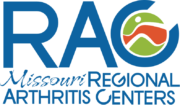As with all chronic health conditions, it can be helpful to recognize the early signs and symptoms of a heart attack or stroke. It is also important to be aware of the impact of heart disease as a chronic condition. Taking active steps to reduce your risk for a chronic condition can make a difference in extending your life and improving your quality of life during that time! Now, you may be wondering why the Missouri Arthritis program is talking about heart disease. Many of the participants who complete our six-week Chronic Disease Self-Management Program indicate that they have one or more chronic health conditions, including high blood pressure, arthritis, high cholesterol, diabetes, and a heart condition. Did you know that 62.2% of adults in Missouri with cardiovascular (heart) disease also have arthritis? (BRFSS, 2009) As an individual with arthritis, or as a loved one to someone with arthritis, it is important that you have an awareness of heart disease.
Warning Signs of a Heart Attack or Stroke
There are four main warning signs of a heart attack:
- "Uncomfortable pressure, squeezing, fullness or pain in the center of your chest. It lasts more than a few minutes, or goes away and comes back.
- Pain or discomfort in one or both arms, the back, neck, jaw or stomach.
- Shortness of breath with or without chest discomfort.
- Other signs such as breaking out in a cold sweat, nausea or lightheadedness."
The main symptom for both men and women is chest pain or discomfort. Women are more likely to show other common symptoms, including jaw pain, shortness of breath, and nausea. (Go Red for Women)
Strokes have five main warning signs:
- "Sudden numbness or weakness of the face, arm or leg, especially on one side of the body.
- Sudden confusion, trouble speaking or understanding.
- Sudden trouble seeing in one or both eyes.
- Sudden trouble walking, dizziness, loss of balance or coordination.
- Sudden severe headache with no known cause." (Go Red for Women)
What to do: Heart Attack or Stroke
If you believe you are having a heart attack or stroke, if you are experiencing any of the symptoms listed above, or if you witness someone else who appears to be showing any of the symptoms of a heart attack or stroke, it is important to do the following:
Heart Disease (Go Red for Women) (CDC Heart Disease & Stroke Prevention)
- Call 911 immediately
- Get to a hospital right away
- A person's chances of surviving a heart attack increases when emergency treatment is received quickly
Stroke (Go Red for Women) (CDC Heart Disease & Stroke Prevention)
- Check the time when symptoms begin appearing
- Call 911 immediately
- Get to a hospital right away
Be One in a Million HeartsTM
The Million HeartsTM campaign is a new national initiative to help prevent one million heart attacks and strokes over the next five years. Potentially, after reading this, you may have more knowledge than you had before about the dangers of heart disease. As an individual, you can take specific steps to help reduce your risk of a heart attack or stroke. Click here to read more about what you can do, and to make a commitment to these actions. And then, share this information with friends, family members, coworkers, neighbors, and strangers!
